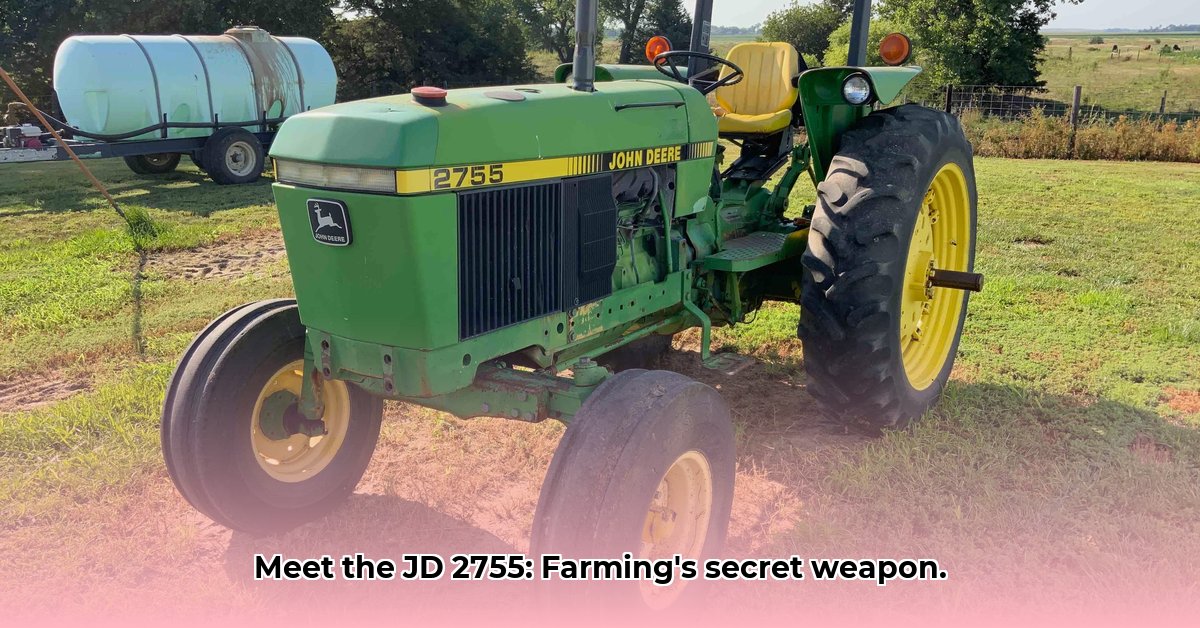
JD 2755 Tractor: A Workhorse for Sustainable Farming
The John Deere 2755 tractor, produced between 1987 and 1992, wasn't engineered with modern sustainability buzzwords in mind. Yet, its enduring presence on farms worldwide speaks volumes about its surprising contribution to sustainable agriculture. Its robust, reliable design – a hallmark of a simpler era – allowed it to withstand years of arduous work. This wasn't a tractor designed for disposability; it was built for longevity. And that longevity is a key factor in its surprisingly sustainable profile. How many modern machines can boast such a lifespan? The 2755’s extended life significantly reduces the continuous cycle of manufacturing, utilization, and disposal of equipment—a substantial benefit for both the environment and your operating budget. It’s a testament to a build quality that prioritized enduring function over fleeting trends. This enduring quality raises a crucial question: Could modern agricultural equipment design learn from this emphasis on durability? For more information on used John Deere tractors, check out this resource.
Fuel Efficiency: Getting More Mileage Out of Every Gallon
Precise fuel consumption figures for the 2755 are challenging to definitively establish. However, its relatively modest 88-horsepower engine likely consumed less fuel than its more powerful contemporaries. This translates to decreased greenhouse gas emissions and reduced operating costs – both essential components of sustainable farming practices. It wasn't merely about maximizing fuel economy; it was about responsible resource management. Isn't this a valuable lesson for the future of agricultural machinery innovation?
Easy Repairs: Keeping it Running, Season After Season
Unlike many modern tractors requiring specialized tools and highly trained technicians for even minor repairs, the 2755 was designed with straightforward maintainability in mind. Its uncomplicated design simplifies maintenance and repair, fostering local networks of repair shops and significantly extending the tractor's useful life beyond its initial design parameters. This simplicity is a cornerstone of sustainability; it's about finding resourceful solutions, maximizing operational life, and minimizing waste. This characteristic, rarely emphasized in modern agricultural machine design, deserves a renewed focus.
Missing Modern Features: A Trade-Off Between Functionality and Innovation?
The 2755 undeniably lacks the advanced features of contemporary tractors. GPS guidance, sophisticated emission controls, and other technological advancements are absent. It's a product of its time, and that time didn't prioritize the technological innovations that define modern sustainability. But does this absence diminish its contribution to sustainable practices? Given its extended lifespan, its comparative simplicity arguably makes it a stronger contender when assessing the full lifecycle of agricultural equipment.
A Balanced Perspective: Legacy and Limitations
While the JD 2755 doesn't meet every modern sustainability benchmark, its lasting impact is undeniable. Its robust construction and straightforward design contributed to a remarkably long operational lifespan. This longevity directly supports environmentally conscious farming practices, underscoring the significance of considering a machine’s entire lifecycle when assessing its sustainability. It’s a compelling argument for a more holistic assessment methodology within the agricultural equipment sector.
How to Extend the Lifespan of a John Deere 2755 Tractor
Key Takeaways:
- Proactive maintenance is paramount for maximizing the lifespan of a John Deere 2755.
- High repair costs, specifically for ZF components (such as the front axle and transmission), represent a significant financial consideration.
- Fuel efficiency is notably lower compared to modern tractors, influencing both operating costs and environmental impact.
- A balanced strategy incorporating preventative maintenance and strategic upgrades can considerably extend the tractor's operational life.
Prioritizing Preventative Maintenance: The Foundation of Longevity
Extending the lifespan of a John Deere 2755 starts with diligent preventative maintenance.
- Regular Oil Changes: Adherence to the recommended oil change schedule is crucial for minimizing engine wear.
- Fluid Checks: Regularly check hydraulic and transmission fluids, topping them off as needed to prevent catastrophic failures.
- Filter Replacements: Replacing air, fuel, and hydraulic filters prevents costly repairs and ensures optimal performance.
- Lubrication: Regular lubrication of grease fittings is essential for preventing premature wear and tear.
- Visual Inspections: Perform a thorough visual inspection before each use, checking for leaks, loose bolts, or other potential issues and address them promptly.
Addressing the Achilles Heel: ZF Components
ZF components, particularly the front axle and transmission, are known for high repair costs. Preventative maintenance, careful operation, and prompt repairs are vital for maximizing their lifespan and minimizing expensive replacements.
Fuel Efficiency and Environmental Considerations
The 2755’s fuel consumption is relatively high compared to modern tractors. Optimizing operational practices, minimizing idling time, and potentially exploring the use of biofuels can offer avenues of mitigation.
Beyond Basic Maintenance: Strategic Upgrades
Strategic upgrades can further extend the 2755’s operational life. Consider these:
- Tire Replacement: Investing in high-quality tires improves traction and reduces wear and tear.
- Electrical System Check-up: Addressing any wiring issues promptly prevents escalating problems.
- Hydraulic System Upgrades: Prompt repair of leaks or damaged components prevents more extensive damage.
A Holistic Approach to Sustainable Farming
Extending the life of a John Deere 2755 tractor is not simply about operational longevity; it's an integral component of sustainable agricultural practices. By maximizing the machine's utility and minimizing waste, farmers contribute to environmentally responsible farming. A well-maintained 2755 can provide many years of reliable service, emphasizing the importance of proactive and informed maintenance.